which Joyce explained to friends as a warning to the ruling classes:
the oppressed rise, eventually, in every historical cycle.”
shall the pharce for the nunce come to a setdown secular phoenish.”
The collected works of James Joyce


 Great to see a brief and highly readable account of Marshall McLuhan from Douglas Coupland.
Great to see a brief and highly readable account of Marshall McLuhan from Douglas Coupland.



 One of the things I most regretted about not having the complete Tale of The Tribe course with Bob - we never really got to discuss Marshall McLuhan.
One of the things I most regretted about not having the complete Tale of The Tribe course with Bob - we never really got to discuss Marshall McLuhan.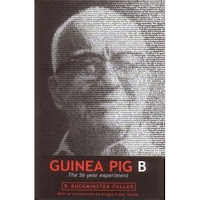
But there is some evidence that this idea of the extension of man, identified by many as the core concept of McLuhan's philosophical stance, may have come from the transcendentalist Bucky. From 1960 to 1970, Constantin Dioxides, an engineer, architect, and urban planner and the founder of the Athens Technological Institute in Greece, organized summer cruises complete with cutting edge guests such as Margaret Mead, and Jonas Salk.
Many, including McLuhan, were guests more than once, but only Fuller was invited on every single trip for twelve years in a row. In The Synergetics Dictionary, under McLuhan, notes such as these were made by Fuller: "Marshall McLuhan told me the first day he met me - on one of the early Dioxide cruises - 'I am your disciple.' He held up copies of No More Secondhand God and Nine Chains to the Moon and said to me 'I've joined your conspiracy!"'

In his notes, he writes: "McLuhan has never made any bones about his indebtedness to me as the original source of most of his ideas. The 'Global Village' was indeed my concept. I don't think he has an original idea. Not one McLuhan says so himself. He's really a great enthusiast, a marvelous populariser and teacher. He has an irrepressible sense of the histrionic, like no one I've known since Frank Lloyd Wright."
Indeed, in Nine Chains to the Moon, a passage reads: "Through the leverage gained by his inanimate instrument extensions of self, he has attained an extended mechanical ability far in excess of his own integral mechanical energy content ability." He goes on to claim that the idea of "man backing up into his future" appears in his books and that Fuller's concept of the "Mechanical Extensions of Man" is the basis for McLuhan's talk of the "Electrical Extensions" of man.
Open source - interesting and relevant post...



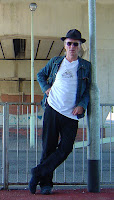 Apparently, once something gets said (written) in their world, it goes into the electronic akashic records and you have to live with the karma of your own stupidity (or something). I find that impossibly conservative and restrictive! So, I can't correct typos, factual errors or uninformed (or badly phrased) opinions - nothing ever gets forgiven and forgotten! Ludicrous! The Wayback machine and cached Google pages suffice for me, and if people quote the parts of my posts to which they are responding, where can confusion arise? Unless I deny I ever said such a thing!
Apparently, once something gets said (written) in their world, it goes into the electronic akashic records and you have to live with the karma of your own stupidity (or something). I find that impossibly conservative and restrictive! So, I can't correct typos, factual errors or uninformed (or badly phrased) opinions - nothing ever gets forgiven and forgotten! Ludicrous! The Wayback machine and cached Google pages suffice for me, and if people quote the parts of my posts to which they are responding, where can confusion arise? Unless I deny I ever said such a thing! However, you can always sample the source and re-mix. I liked John Cage's distinction between communication (with intent to affect the other) and conversation (idling along together in parallel).
However, you can always sample the source and re-mix. I liked John Cage's distinction between communication (with intent to affect the other) and conversation (idling along together in parallel).Meanwhile, I will work on making the blog denser, but not longer - feel free to do what you want with it. You can always check out further opinions of mine on my own blog. Be Seeing You!
NB: the next Maybe Quarterly falls due on the Autumnal Equinox, 23 September 2007 - that leaves you a month to consider making a contribution.

The first of Wilson's MLA courses bridging the political, the social and the psychological, Tale of the Tribe promises to be a landmark journey with our dear Dr. Bob. Starring Giordano Bruno, Giambatista Vico, Friederich Nietzsche, Ernest Fenollosa, Ezra Pound, Alfred Korzybski, James Joyce, Buckminster Fuller, Claude Shannon and Marshall McLuhan -- the nucleus of the extraordinary minds that have helped shape the information age of 21st century and the mindscape of Robert Anton Wilson. Join Wilson as he explores the themes, minds and ideas of his forthcoming book, The Tale of the Tribe.
 I got interested in paper-making (which seems to have come out of the same Southern France where intelligence seems to have had its supporters – the Cathars, the Troubadours, the Spanish Cabbalists, etc.) Muslim Spain and the Languedoc had universities and other high IQ intentions and practices until the Inquisition threw us ALL back in the dungeon of ignorance. Huguenot papermakers (later Protestants, same area of Europe) had to run away from similar persecution, and took their skills with them. Whether the Vose part of my family come from the de Vaux papermakers I have no idea (unproven romantic connection). Harold Bayley has a whole theory linking the watermarks in paper to heretics and subversives.
I got interested in paper-making (which seems to have come out of the same Southern France where intelligence seems to have had its supporters – the Cathars, the Troubadours, the Spanish Cabbalists, etc.) Muslim Spain and the Languedoc had universities and other high IQ intentions and practices until the Inquisition threw us ALL back in the dungeon of ignorance. Huguenot papermakers (later Protestants, same area of Europe) had to run away from similar persecution, and took their skills with them. Whether the Vose part of my family come from the de Vaux papermakers I have no idea (unproven romantic connection). Harold Bayley has a whole theory linking the watermarks in paper to heretics and subversives.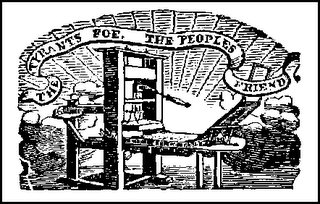 As to paper makers and printing – the people involved in such work seem to have often felt like a threat to the Church and the State. For a start, they could read and write (always dangerous). Secondly, printing meant they could mass-produce pamphlets, newsletters and other scurrilous items for a newly literate public. So the powers-that-be have often controlled printing presses as tightly as they could. Many secret ones continued to function, however. And this still continues to this day (think of Samizdat publications in the USSR, while strict censorship still got enforced by people like the KGB.)
As to paper makers and printing – the people involved in such work seem to have often felt like a threat to the Church and the State. For a start, they could read and write (always dangerous). Secondly, printing meant they could mass-produce pamphlets, newsletters and other scurrilous items for a newly literate public. So the powers-that-be have often controlled printing presses as tightly as they could. Many secret ones continued to function, however. And this still continues to this day (think of Samizdat publications in the USSR, while strict censorship still got enforced by people like the KGB.) I feel particularly drawn to Harold Bayley - he may think Bacon wrote Shakespeare, and he may have a point, but his work on watermarks and their secret significance certainly intrigues me. Look at this very modern looking but enigmatic fool's cap watermark, for instance - yeh Cathars, troubadours, jesters, sufis, you got it. Oh and foolscap paper, too, of course...
I feel particularly drawn to Harold Bayley - he may think Bacon wrote Shakespeare, and he may have a point, but his work on watermarks and their secret significance certainly intrigues me. Look at this very modern looking but enigmatic fool's cap watermark, for instance - yeh Cathars, troubadours, jesters, sufis, you got it. Oh and foolscap paper, too, of course...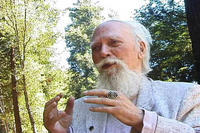
Bumph: "The first of Wilson's MLA courses bridging the political, the social and the psychological, Tale of the Tribe promises to be a landmark journey with our dear Dr. Bob. Starring Giordano Bruno, Giambatista Vico, Friederich Nietzsche, Ernest Fenollosa, Ezra Pound, Alfred Korzybski, James Joyce, Buckminster Fuller, Claude Shannon and Marshall McLuhan -- the nucleus of the extraordinary minds that have helped shape the information age of 21st century and the mindscape of Robert Anton Wilson. Join Wilson as he explores the themes, minds and ideas of his forthcoming book, The Tale of the Tribe."
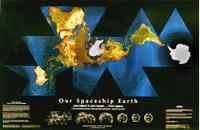 I would say that all the people Bob enjoys seem to have a ‘magical’ quality to them – and the theme of hidden streams of ancient knowledge, as well as the possibility of new models of the universe. Although Bob acknowledges an interest in Crowley, he doesn’t recommend setting out to become a magickal practitioner, as such. Uncle Al does seem to obsess people (the Cult of Personality worked for him) but Bob leans the other way, it seems to me, towards freeing oneself from obsessions and habits of thinking, and/or worship of any particular form or method or person. He also explains the magical side to the arts (thinking of Burroughs and Pound and Joyce and the Surrealists) as well as of the sciences (with particular reference to Quantum Physics and anthropology and futurist planning and design).
I would say that all the people Bob enjoys seem to have a ‘magical’ quality to them – and the theme of hidden streams of ancient knowledge, as well as the possibility of new models of the universe. Although Bob acknowledges an interest in Crowley, he doesn’t recommend setting out to become a magickal practitioner, as such. Uncle Al does seem to obsess people (the Cult of Personality worked for him) but Bob leans the other way, it seems to me, towards freeing oneself from obsessions and habits of thinking, and/or worship of any particular form or method or person. He also explains the magical side to the arts (thinking of Burroughs and Pound and Joyce and the Surrealists) as well as of the sciences (with particular reference to Quantum Physics and anthropology and futurist planning and design).